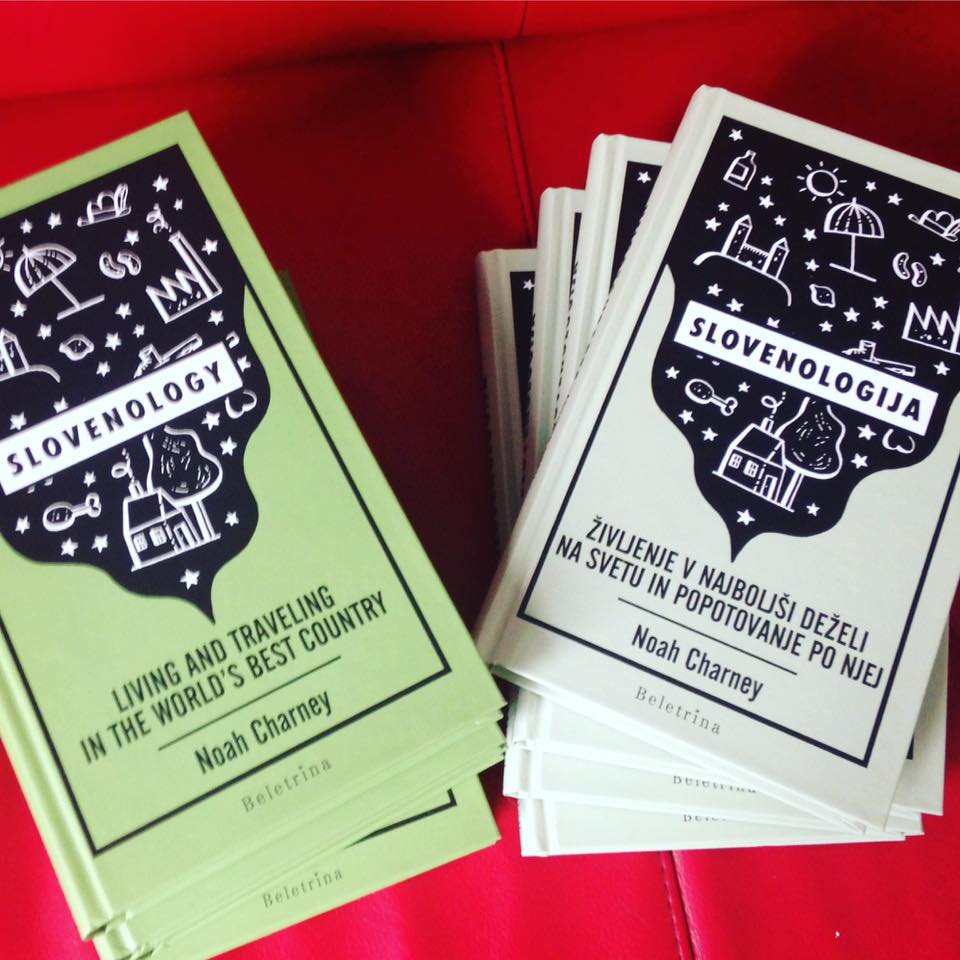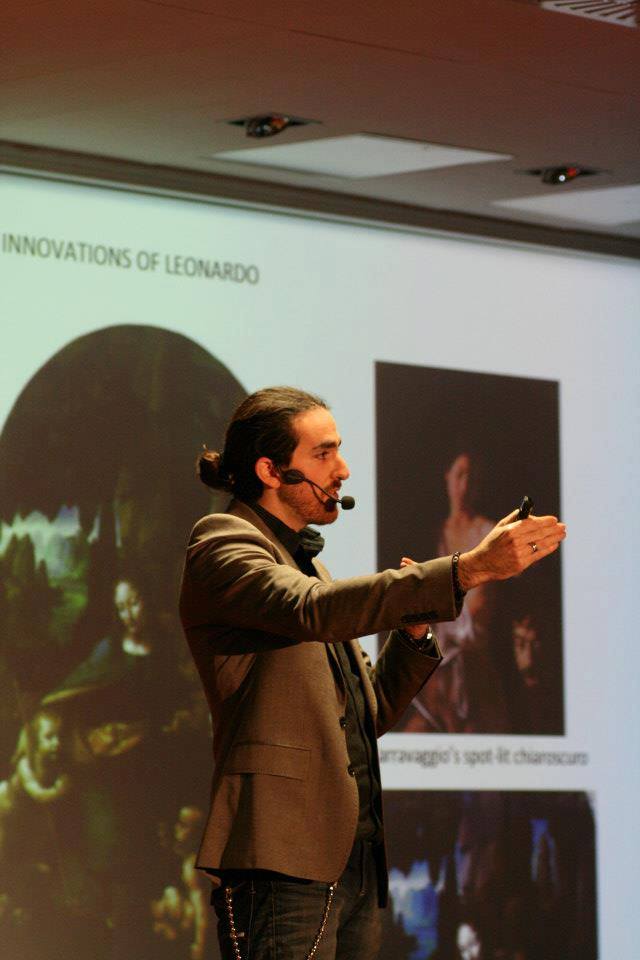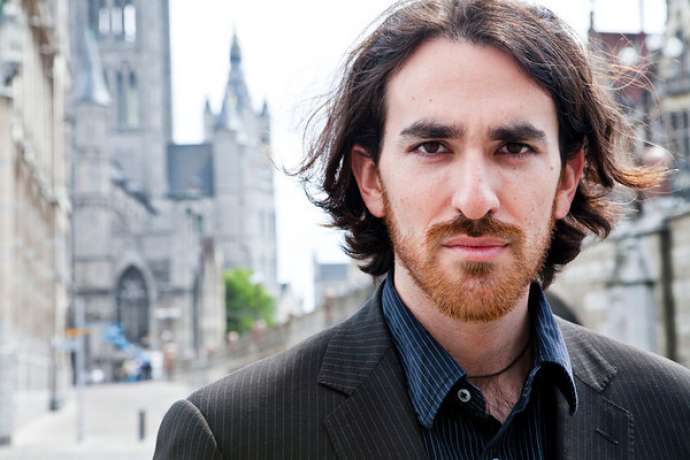If you’re reading this you almost certainly know of Dr Noah Charney, perhaps the most famous American living in Slovenia, who turns up regularly on TV and in print sharing his love of the country and exploring various aspects of its culture, as exemplified in his book Slovenology (2017), a new podcast of the same name, and a list of projects that seems to grow by the week. We thus got in touch for an email interview, with the focus on how he’s been able to settle so well, and so quickly, in his new home.
What brought you to Slovenia?
Love, which I believe is the primary import. I had dated a Slovenian girl when I was living in London and had come to visit on some holidays and try to learn the language a bit. Later on when I was studying at Cambridge but had ants in my pants and wanted to try living in various European countries one of them I went to was Slovenia. I lived here for a few months and during that time wound up deciding to transfer to University of Ljubljana to finish my Ph.D and I met my current wife as well as sold my first book all at the same time. It seems like Kismet.
How long after you arrived in Slovenia did you start studying the language, and what was the nature of these early efforts?
I tried memorizing some phrases and some of the basics before I actually moved here but to be honest I didn't learn much of anything and I never actually took a course in it until I started speaking with my mother-in-law. That was the best education. I still have trouble with grammar, and just about every sentence has a grammatical error in it. I never bothered memorizing the declensions, for example. But I speak fluently and quickly even with my mistakes and at least so far people seem to think it's cute. I'll ride that wave as long as I can.

An ebook version of Slovenology can be found on Amazon, while print copies are available in Slovenia
Have you ever engaged in a formal study program for the language?
No, nothing at all. I really should but what I need to do most is just take time to sit down and memorize declension endings and that would serve me well. But I keep on feeling like I don't have time to do it. I've certainly plateaued and could live my whole life here at this level without improving. That would be a bit of a shame, I think.
How do you feel about your level of Slovene now, and what do you do to improve it?
I'm entirely comfortable with my level of Slovene. A few years ago I began to host events in the language and make jokes in it and feel like I was my own normal personality even in this language. I'm not bothered at all if I make frequent grammatical errors. I would rather throw myself in and hope for the best. At this point I've almost made a positive personality trait out of speaking with funny inadvertently idioms. I host events regularly even do TV work in Slovenian and I've been told by many people that it would be a shame if I speak too much more correctly because there is a charm to my current level. If that's what they think sounds good to me
How did you build your personal and professional networks here?
I have no particular interest in meeting expats, especially Americans. That doesn't mean that I'm avoiding them but I'm making no effort to meet them as I'm most interested in meeting locals. That said, I had a strategy when I first moved here. I am a writer and occasionally write for magazines and newspapers so I have the ability to present people to the media and give them exposure to anglophone readers which Slovenians consider a plus, a bit out of the ordinary and something desirable. I used this to my advantage early on, as I wrote to various people. Because I admired their work, from rock musicians to comedians to actors to writers, and I asked if I could meet with them for an interview. About a third of the people I met became friends and the rest of them were useful contacts to have in a country with probably just a few hundred people living and working in the literary and cultural and arts sphere, so you meet one and you can easily meet the others. This was an intentional tactic that worked out well for me, and it has led to lots of collaborations with big names here. It also makes for a weird situation where I met really famous celebrities long before I met normal people.
How was finding paid work in Slovenia?
I am lucky in that I work as a writer primarily, and so my work is portable. It is probably the best of all to be working for American and British Publishers and publications and living here. But in the last few years I have done much more work locally. The work that I am asked to do most is in terms of hosting events and giving talks mostly about my perspectives as an American in love with this country, and noticing quirks and differences in the cultures that Slovenian find funny, and they especially appreciate the fact that I really do think this is the world's best country to live in, which often surprises locals.
I also find a lot of work writing text in English for Slovenians and Slovenian companies and editing text that was written by non-native speakers or translated into English by the same. I could probably do this sort of thing full-time but I wind up doing it part-time so I have the opportunity to do my own writing.
For anglophone foreigners using our language abilities is probably the most immediately desired thing, as just about every Slovenian company with any outward facing exposure needs to have texts in English and someone to either write them or proof them. There is also a real interest in collaborating with anglophone expats who are invited for consulting on rules for local projects, because they provide insight and a different perspective. So actually think there are ample opportunities. However, one should be aware that work tends to pay less here than it would in other countries, but the quality of life comes at a lower price here so it all balances out.
Culture shock is a well-studied phenomenon, moving through the stages of honeymoon, frustration, adjustment and acceptance. What has been your experience of culture shock in Slovenia?
I didn't have culture shock because my goal was always to live in a European country. I was not particularly interested in living the American lifestyle. So I am seeking out new cultural experiences, not hiding from them. The cultures are not so different here from what I'm used to in the eight different countries I've lived in. They're usually little details like grace notes that stand out to me, but nothing that would constitute shock. Maybe drinking schnapps for breakfast is one.
Are there some aspects of Slovene culture that you took to immediately?
I like pretty much everything and I'm particularly delighted to adopt local traditions. I'm totally into copati [slippers]. The American habit of wearing shoes outside and in seems weird to me now. I prefer living in a second language as everything is a bit more interesting. I'm excited to go to the supermarket for instance every time I go. Just different enough to be intriguing and moderate exotic.
Are there some aspects that remain challenging?
Really not at all. I feel completely at home here and did right from the start. I think the most important thing for me was achieving a comfort level with the language which allows me to interact with anybody. It is very easy to live in Ljubljana and speak only English, but once you get outside of the capital and if you want to talk to people of older generations or in more rural settings it helps a lot to speak Slovene.
What is something American you'd like to see adopted in Slovenia?
I'm not the biggest fan of America, so I'm not sure there's anything that Slovenia can learn from it. I guess I miss American breakfast traditions, but I can make those myself. If someone could work out the time zone differences so I can watch Boston Red Sox games live I would be quite pleased.
And what is something Slovene you'd like to see adopted in America?
America could learn a lot from Slovenia. I've written an article about it for the Washington Post and an extended version of the same article appears in my book. I feel like Slovenia has an ideal balance of the best bits of socialism with capitalism and freedom. It's hard to imagine a country that has a better balance, although nowhere is completely utopian.

Dr Charney also teaches art crime and art history, as well as writing for publication
2018 was a very productive year for you – what can we expect in 2019?
It's very kind of you to say. Yes, I seem to function only on creative overdrive, and I love starting and finishing projects, so I'm happy to skip the middle bit.
I just launched what will be a weekly free podcast that was sponsored by the US Embassy called Slovenology the Podcast. A new episode will come out every Sunday. I will also shortly be releasing a sort of a sequel to that book but coming out only in Slovenian. It will be called Zvezdologija and feature my interviews with interesting and famous Slovenians. I have been interviewing people here in public events for several years now, and my interviews are very idiosyncratic as most of the people I interview are friends so we tend to be very goofy and loose. So this book will include interviews and also plumb the depths of Slovenian celebrity from an unusual angle.
Anyone interested in keeping track of my escapades is welcome to join me on social media. I also host free of charge public interview events and workshops and courses with some regularity. There are enough of them that it’s best to keep track of my activities on social media or a blog that I'm hoping to update regularly this year at slovenology.co.uk
Do you think you'll stay in Slovenia "the rest of your life"?
I certainly hope to. I have two daughters born here and have never felt more at home anywhere. This is the place to be!
You can try and keep up Dr Charney on various platforms, including Facebook, www.noahcharney.com, www.slovenology.co.uk and www.artcrimeresearch.org. You can also follow the Slovenoogy podcast wherever you get podcasts, with the iTunes link here.



